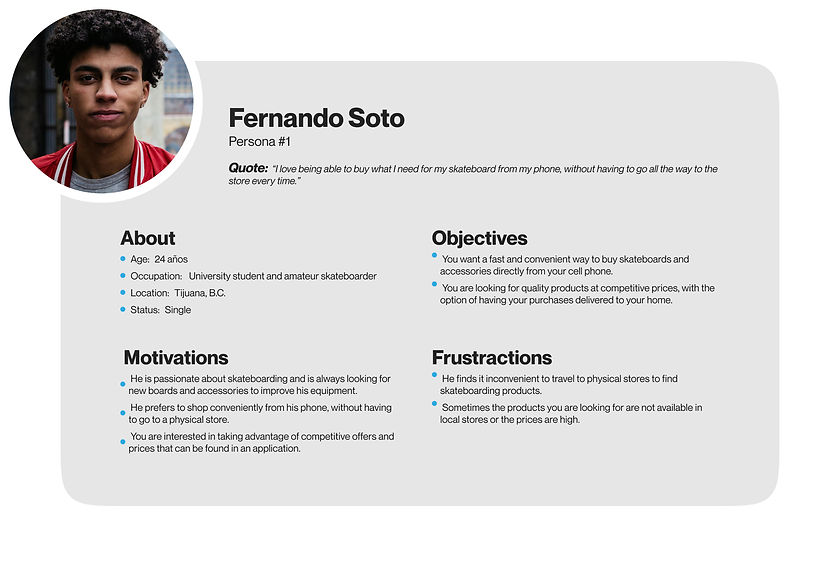Project Overview
THE PROBLEM
Sell your skateboards from a mobile application so that your customers can more easily purchase skateboard products, without the need and physically go to the store.
THE GOAL
Design an application for SkateTj that allows you to sell your products and provide information about the world of skateboarding.
Attract new potential customers to purchase products.
THE PRODUCT
SkateTj is a small regional company located in the city of Tijuana B.C. SkateTj strives to offer skateboards and a wide variety of accessories. Offering a wide spectrum of competitive prices. SkateTj targets customers such as passionate and potential new customers who do not have a place to purchase skate products.
MY ROLE
UX designer designing an app for SkateTj from conception to delivery.
RESPONSIBILITIES
Conducting interviews, paper and digital wireframing, low and high-fidelity prototyping, conducting usability studies, accounting for accessibility, and iterating on designs.
PROJECT DURATION
October 2021 to November 2021
Understanding the user
I conducted interviews and created empathy maps to understand the users I am designing for and their needs. A main group of users identified through the research were young people who are passionate or who practice the sport or people who want to start in this world of skateboarding.
This group of users confirmed initial assumptions about SkateTj's customers, but the investigation also revealed that finding a store in the city was not the only factor limiting users from purchasing such products.
Other user problems include lack of knowledge, interests or challenges in the difficulty of buying a skateboard or going to the store in person.
PERSONA AND PROBLEM STATEMENT
Fernando Soto
Fernando Soto, 24 years old, is a university student and amateur skater in Tijuana. Passionate about skateboarding, he is always looking for new boards and accessories to improve his gear and prefers to shop from his phone, avoiding trips to physical stores. He is interested in taking advantage of deals and competitive prices available on apps. He gets frustrated when he has to go to stores that don't always have the products he's looking for or where the prices are high. His goal is to find a quick and convenient way to buy skateboards and accessories directly from his mobile, with the option to have his purchases delivered to his home. As he says, "I love being able to buy what I need for my skate from my phone, without having to go to the store every time."

Starting the design
DIGITAL WIREFRAMES
As the initial design phase continued, I made sure to base screen designs on feedback and findings from the user research

LOW-FIDILITY PROTOTYPE
Using the completed set of digital wireframes, I created a low-fidelity prototype. The primary user flow I connected was finding an item and placing it in the cart, so the prototype could be used in a usability study.

Usability study: Findings
I conducted two rounds of usability studies. Findings from the first study helped guide the designs from wireframes to mockups. The second study used a high-fidelity prototype and revealed what aspects of the mockups needed refining.
Study type:
Unmoderated usability study
Location:
Mexico, TJ, remote
Participants:
5 participants
Length:
10-30 minutes
CONFUSING
01
Adding products to the cart was confusing due to unclear button placement.
CONFUSING
02
Users felt unsure about the confirmation of their purchase after completing the order.
CONFUSING
03
Simplifying visual hierarchy improved task completion rates.


Everything you need for skateboarding in Tijuana



Going Forward
TAKEAWAYS
IMPACT
The application makes users feel that SkateTj really thinks about how it solves their needs.
A quote from peer comments: “The app made it easier for me to find the products I was looking for. I would definitely use this app to make my skateboard purchases."
WHAT I LEARNED
While designing the SkateTj application, I learned that the first ideas that one has for the application are only the beginning of a process to be able to reach a final result and that the user can interact satisfactorily and without difficulties. The usability studies and peer feedback that were conducted helped in understanding how users interact with the application designs.
NEXT STEPS
1.- RESEARCH
Conduct another round of usability studies to validate whether the pain points users experienced have been effectively addressed.
2.- FEATURES
Further user research will be conducted to determine if there are new areas of need for users.
3.- REWARDS
Research will be carried out on whether it is necessary to improve the design of the application to make it more comfortable to navigate.





